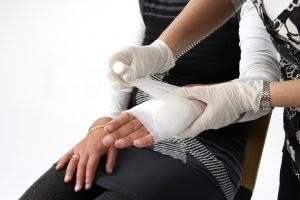Need Immediate help? Call 717-397-1010
After Hours Call / Text 717-471-2168
Need Immediate help? Call 717-397-1010
After Hours Call / Text 717-471-2168
 If you have been injured at work, it makes sense to hire a lawyer as soon as possible to ensure you get the compensation to which you are entitled. However, what should one expect when they decide to call a work injury lawyer? Understanding the information a lawyer needs before making the call can lead to a better consultation and get more out of the typically free service law firms offer to their potential clients.
If you have been injured at work, it makes sense to hire a lawyer as soon as possible to ensure you get the compensation to which you are entitled. However, what should one expect when they decide to call a work injury lawyer? Understanding the information a lawyer needs before making the call can lead to a better consultation and get more out of the typically free service law firms offer to their potential clients.
The first thing a lawyer will need is your employment information. This includes:
The amount of benefits offered to workers largely depends on the average weekly pay of a worker. Further, the marital status and number of children under the age of 18 can have an impact on a claim award. Have this information ready prior to calling a lawyer for the best idea of how successful your claim will be and what you can expect out of an award.
The accident itself can have an impact on what can be recovered in terms of compensation after an injury. Relevant information includes:
History of medical treatment has a bearing on how the claim will proceed. This information includes:
Above is the minimal information a person should have on hand when contacting a lawyer. Having correspondence with the employer or insurance company such as if you have received weekly benefits, how medical care was paid for, outstanding medical bills, contact information of any insurance agents spoken to, and any offers that have already been made on the claim are helpful when applicable to the situation. Further, any information from before the accident such as previous injuries and illness or previous Workers’ Compensation or personal injury claims can be helpful.
The next step is finding the right lawyer for your case. Contact our team today for a free consultation on your claim.
 When a worker is injured on the job, it’s difficult to be critical since they are in pain. However, having a drug test after a work injury can be crucial. While Workers’ Compensation is a no-fault system, a worker that was under the influence will not be eligible for the same benefits as an employee that was exercising proper behavior. In fact, a drug test could prevent a worker from collecting benefits at all.
When a worker is injured on the job, it’s difficult to be critical since they are in pain. However, having a drug test after a work injury can be crucial. While Workers’ Compensation is a no-fault system, a worker that was under the influence will not be eligible for the same benefits as an employee that was exercising proper behavior. In fact, a drug test could prevent a worker from collecting benefits at all.
Drug testing an employee is not always legal. This is because they are owed a certain amount of privacy. However, when an injury becomes involved, the legal stance changes a bit. In many cases, there is good reason to be suspicious, which is when it is legal to drug test an employee normally. In most cases, it can be difficult to prove there was good reason to be suspicious but having an accident that could have been avoided is one of the best ways to justify why an employee should be tested.
However, there should still be caution expressed, as illegally testing an employee will only cause worse issues when it comes to the work injury.
Hopefully, as an employer, you have considered the possibility of an injured worker prior to its happening. Additionally, it should be a consideration of how it will be handled if an intoxicated person comes to work even if they are not injured. The best thing a company can do is write a drug testing policy in their employee handbook, outlining the reasoning for drug testing and having employees sign an acknowledgment of your policies.
A drug test should happen as soon as possible after an injury. The quicker the test, the more accurate the results. After all, many drugs, such as alcohol, quickly dissipate and are difficult to prove. However, showing the person was above the acceptable BAC percentage an hour after the injury will be good evidence against the claim.
If you use a lab that is not reputable, it will be argued during the claim. Don’t count on the employee not having legal representation, as many immediately seek a lawyer after being injured on the job.
Regardless of the results of the test or if you are able to demand a test, medical care should be given as soon as possible. Even if the employee was heavily intoxicated, you still have a duty of care in ensuring they receive medical attention when necessary.
If you have been injured at work and your employer is trying to use evidence of intoxication against you, contact our team today. We understand both sides of defense and will use our experience to benefit you.
 As desk jobs become more popular as a type of occupation, injuries related to such jobs are increasing. It may sound unlikely an injury would incur while sitting behind a desk but sitting all day can have a negative impact on the body, especially considering approximately 80% of workers today work in a role that involves little or no physical activity. Straining the arms or sitting without proper support, along with fast typing, puts workers at a higher risk of injury than most consider.
As desk jobs become more popular as a type of occupation, injuries related to such jobs are increasing. It may sound unlikely an injury would incur while sitting behind a desk but sitting all day can have a negative impact on the body, especially considering approximately 80% of workers today work in a role that involves little or no physical activity. Straining the arms or sitting without proper support, along with fast typing, puts workers at a higher risk of injury than most consider.
Further, desk jobs heighten some risks for repetitive injuries. For instance, someone may develop carpal tunnel or other wrist-related injuries by continually using a keyboard every day, particularly if the keyboard is not ergonomic. While these types of injuries are not always avoidable, particularly when you have a predisposition toward development of certain conditions, there are some tips that can make your work environment much more comfortable.
If you are beginning to feel the first signs of a work injury, or are concerned about aches and pains you have been feeling, consider the following tips to help take care of yourself at work.
If you already are seeing the signs of a work injury, contact our team today for a free consultation on your claim.
 When you are injured at work, it can be a time of many emotions. First, there is concern over your health and safety. But second, there is concern over what this means for your job and what actions need to be taken following an injury that happens in the workplace. While each state has its own regulations on how things are handled, and each company has its own set of policies, there are steps that can be taken in any jurisdiction or company following an accident.
When you are injured at work, it can be a time of many emotions. First, there is concern over your health and safety. But second, there is concern over what this means for your job and what actions need to be taken following an injury that happens in the workplace. While each state has its own regulations on how things are handled, and each company has its own set of policies, there are steps that can be taken in any jurisdiction or company following an accident.
Following a work injury, take the following precautions to ensure your rights are protected:
If you have been injured on the job, you need legal representation to ensure a successful claim. Contact our team today for a free consultation on your case.